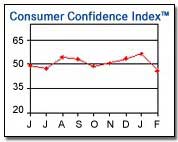 The Consumer Confidence Index, which had increased in January, declined sharply in February and now stands at 46.0 (1985=100), down from 56.5 in January, the Conference Board reported.
The Consumer Confidence Index, which had increased in January, declined sharply in February and now stands at 46.0 (1985=100), down from 56.5 in January, the Conference Board reported.
The Present Situation Index decreased to 19.4 from 25.2 last month, and the Expectations Index declined to 63.8 from 77.3 in January, the Consumer Confidence Survey found.
"Consumer Confidence, which had been improving over the past few months, declined sharply in February," said Lynn Franco, director of The Conference Board Consumer Research Center.
"Concerns about current business conditions and the job market pushed the Present Situation Index down to its lowest level in 27 years (Feb. 1983, 17.5). Consumers' short-term outlook also took a turn for the worse, with fewer consumers anticipating an improvement in business conditions and the job market over the next six months. Consumers also remain extremely pessimistic about their income prospects. This combination of earnings and job anxieties is likely to continue to curb spending."
Other findings:
- Consumers' assessment of current-day conditions soured in February. Those claiming conditions are "good" decreased to 6.2% from 8.5% in January, while those claiming business conditions are "bad" increased to 46.3% from 44.7%.
- Consumers' assessment of the labor market was also more pessimistic. Those saying jobs are "hard to get" rose to 47.7% from 46.5% last month, while those saying jobs are "plentiful" decreased to 3.6% from 4.4%.
- Consumers' short-term outlook, which had been improving, lost considerable ground in February. The percentage of consumers anticipating an improvement in business conditions over the next six months decreased to 16.7% from 20.7% in January, while those anticipating conditions will worsen increased to 15.3% from 12.7%.
- Regarding the outlook for the labor market, the percentage of consumers expecting fewer jobs increased to 24.6% from 18.9% last month. Those anticipating more jobs will become available in the months ahead declined to 13.4% from 15.8%. The proportion of consumers anticipating an increase in their incomes declined to 9.5% from 11.0%.
About the data: The Consumer Confidence Survey is based on a representative sample of 5,000 US households. The monthly survey is conducted for The Conference Board by TNS. The cutoff date for February's preliminary results was February 17.



